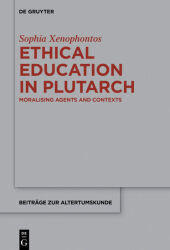 Neuerscheinungen 2016Stand: 2020-02-01 |
Schnellsuche
ISBN/Stichwort/Autor
|
Herderstraße 10
10625 Berlin
Tel.: 030 315 714 16
Fax 030 315 714 14
info@buchspektrum.de |

Sophia Xenophontos
Ethical Education in Plutarch
Moralising Agents and Contexts
2016. X, 266 S. 230 mm
Verlag/Jahr: DE GRUYTER 2016
ISBN: 3-11-035036-X (311035036X)
Neue ISBN: 978-3-11-035036-4 (9783110350364)
Preis und Lieferzeit: Bitte klicken
Die Beiträge zur Altertumskunde enthalten Monographien, Sammelbände, Editionen, Übersetzungen und Kommentare zu Themen aus den Bereichen Klassische, Mittel- und Neulateinische Philologie, Alte Geschichte, Archäologie, Antike Philosophie sowie Nachwirken der Antike bis in die Neuzeit. Dadurch leistet die Reihe einen umfassenden Beitrag zur Erschließung klassischer Literatur und zur Forschung im gesamten Gebiet der Altertumswissenschaften.
The volumes published in the series "Beiträge zur Altertumskunde" comprise monographs, collective volumes, editions, translations and commentaries on various topics from the fields of Greek and Latin Philology, Ancient History, Archeology, Ancient Philosophy as well as Classical Reception Studies. The series thus offers indispensable research tools for a wide range of disciplines related to Ancient Studies.
In addition to being the author of the Parallel Lives of noble Greeks and Romans, Plutarch of Chaeronea (AD c.46-c.120) is widely known for his rich ethical theory, which has ensured him a reputation as one of the most profound moralists in antiquity and beyond. Previous studies have considered Plutarch´s moralism in the light of specific works or group of works, so that an exploration of his overall concept of ethical education remains a desideratum. Bringing together a wide range of texts from both the Parallel Lives and the Moralia, this study puts the moralising agents that Plutarch considers important for ethical development at the heart of its interpretation. These agents operate in different educational settings, and perform distinct moralising roles, dictated by the special features of the type of moral education they are expected to enact. Ethical education in Plutarch becomes a distinctive manifestation of paideia vis-à-vis the intellectual trends of the Imperial period, especially in contexts of cultural identity and power. By reappraising Plutarch´s ethical authority and the significance of his didactic spirit, this book will appeal not only to scholars and students of Plutarch, but to anyone interested in the history of moral education and the development of Greek ethics.
Sophia Xenophontos, University of Glasgow, UK.


